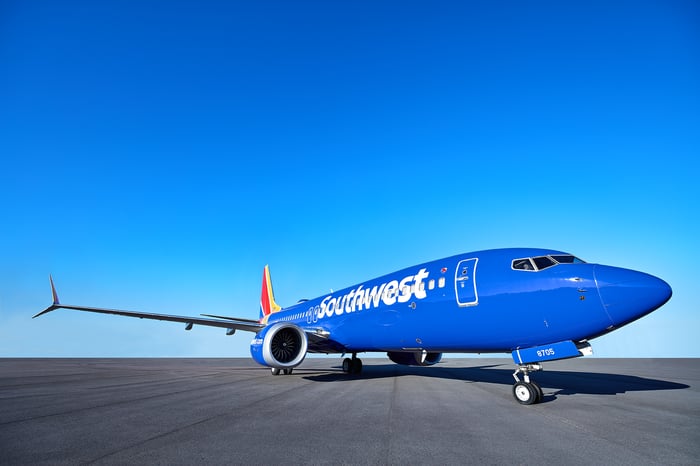On April 11, Boeing (BA -0.20%) announced that it had created a software fix designed to prevent a repeat of the tragic crashes of two 737 MAX 8 planes over the past six months. CEO Dennis Muilenberg stated that the aerospace giant had already conducted 96 test flights using the updated software -- including one with him on board -- to ensure that the plane is now working as intended.
An FAA panel released the findings of its initial review of the new software last week, calling it "operationally suitable." Nevertheless, the Boeing 737 MAX still isn't close to getting back in the air. In fact, Southwest Airlines (LUV 2.60%), American Airlines (AAL 6.60%), and United Continental (UAL 17.45%) all recently extended their proactive cancellations of 737 MAX flights well into the summer season.
Another hurdle cleared
Getting the FAA's preliminary approval for the 737 MAX software fix is a sign that Boeing has taken the necessary steps to make its best-selling model safe to fly. The FAA draft report also recommended additional computer training for pilots, but stopped short of calling for simulator training for pilots who already know how to fly the previous version of the 737.

Boeing has improved the software controlling its 737 MAX jets. Image source: Boeing.
That said, Boeing and the FAA are both under intense scrutiny due to the latter's initial certification of the 737 MAX despite the problems that later surfaced. The grounding of the 737 MAX will only be lifted after a thorough analysis of the initial problem and Boeing's solution by a multinational group of regulators. While other countries used to be content to follow the FAA's lead, consensus-building will be critical for the foreseeable future.
As a result, the global grounding of the 737 MAX is likely to continue for months. At the moment, it's impossible to pin down a firm date for its recertification.
Airlines remove the 737 MAX from summer schedules
This uncertainty has forced airlines to make tough decisions about their schedules for the fast-approaching summer travel season. The U.S. airlines that already have the 737 MAX in their fleets -- Southwest Airlines, American Airlines, and United Airlines -- don't want to cancel flights unnecessarily. But if flight cancellations are unavoidable, trimming flight schedules sooner rather than later is the best way to minimize the impact on customers.
As of early April, Southwest, American, and United had all removed the 737 MAX from their schedules through early June. That reflected a hope that the troubled plane would be cleared to fly again in time for the most profitable part of the year for airlines.

The 737 MAX grounding has forced airlines including Southwest to cancel flights. Image source: Southwest Airlines.
However, it now seems likely that the 737 MAX grounding will stretch on for several more months. As a result, airlines are facing up to the reality that scheduling the 737 MAX for the July peak travel season may not be realistic.
On April 11, Southwest Airlines announced that it had removed the 737 MAX from its flight schedule through Aug. 5. A few days later, American Airlines followed suit, taking the 737 MAX out of its schedule through Aug. 19. (American is "highly confident that the MAX will be recertified prior to this time," but is taking a conservative approach so that the airline and its customers can plan ahead.) And earlier this week, United Airlines -- which operates the fewest 737 MAX jets among these three carriers -- extended its 737 MAX cancellations into early July.
Southwest, American, and United can try to minimize the amount of lost capacity by increasing aircraft utilization this summer. Nevertheless, the 737 MAX grounding will lead to slower capacity growth over the next few months, particularly at Southwest Airlines.
Can rivals take advantage?
Earlier this month, Delta Air Lines -- the only one of the top four U.S. airlines that doesn't fly the Boeing 737 MAX -- said it expects to achieve solid 1.5% to 3.5% unit revenue growth this quarter. That may indicate that capacity constraints at its rivals are contributing to higher fares and passenger traffic.
Other airlines that are more focused on the domestic market (and particularly those that have more overlap with Southwest Airlines) could see even bigger unit revenue gains.
Many of those smaller carriers have earnings reports scheduled for the upcoming week. Their Q2 forecasts will give investors more insight into just how big a windfall the Boeing 737 MAX grounding is creating for airlines lucky enough not to have that model in their fleets. With Southwest Airlines and American Airlines planning to keep the 737 MAX on ice until at least August, this windfall for other airlines will continue well into the summer season.





